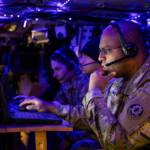
Senate Democrats have nominated Sens. Mark Kelly (D-Ariz.) and Jacky Rosen (D-Nev.) to serve on the Senate Armed Services Committee in the new Congress, while the House Armed Services Committee officially welcomed 16 new members and announced two new subcommittees on Wednesday. Kelly and Rosen replace Doug Jones, who lost his Alabama seat, and Sen. Martin Heinrich (D-N.M.), who is now set to serve on the Senate Appropriations Committee. The full Senate must still ratify both nominations. Senate Republicans have…

 By
By 











